- Home
- Maloney, Darrell
The Yellowstone Event (Book 2): A National Disgrace
The Yellowstone Event (Book 2): A National Disgrace Read online
A NATIONAL DISGRACE
The Yellowstone Event
Book 2
By Darrell Maloney
This is a work of fiction. All persons depicted in this book are fictional characters. Any resemblance to any real person, living or dead, is purely coincidental. Copyright 2017 by Darrell Maloney
This book is dedicated to:
The proud members of the National Park Service.
Here are some fun facts about the
Yellowstone Caldera:
- It’s a real thing. It really does exist
- It’s a super volcano simmering just beneath the surface of Yellowstone National Park
- It has erupted in the past, and will erupt again
- Scientists believe that when it erupts again it will destroy 20 percent of the United States
- You do NOT want to be in that 20 percent
Bearing all that in mind, enjoy the book…
*****************************************
THE STORY THUS FAR…
*****************************************
Tony and Hannah were high school sweethearts, growing up together in Little Rock. Theirs was an existence of the usual stuff: drama and football games and experimentation.
It was actually pretty typical with one exception.
One night when a traveling carnival was in town Hannah had dragged Tony to a midway fortune teller.
“Just to see if you’re telling me the truth about wanting to marry me someday.”
He balked, but just a bit.
“Oh, baby, why do you want me to waste ten bucks to hear some stranger tell you what I’ve always told you?”
“Because if you don’t you have absolutely no chance of getting lucky tonight.”
Ten dollars was a lot of money for a high school boy working a minimum wage part-time job. Still, it didn’t take him long to relent.
She led him to a purple tent where a gypsy woman named Madame Cervelli gave them the usual spiel. Yes, Tony loved her. Yes he’d marry her someday, and they’d have beautiful children together.
If the old woman had stopped there the evening would have ended well but wouldn’t have been memorable.
But she went a step farther.
Madame Cervelli foretold a great catastrophe. Something very vague, but which had something to do with the “great park they call Yellowstone.”
She said something would destroy Yellowstone, and would bring on the downfall of the United States of America as well.
That wasn’t all, though. She said that Hannah and Tony would be caught up in the event. That it would be up to them to save the lives of millions of people. And she hinted they should put their lives on hold to prepare for the event.
Tony lost his cool. This was way more than he’d bargained for. He called the old woman a crazy fraud. He cursed at her. She in turn merely smiled through cragged and missing teeth.
He took Hannah’s arm and stormed out of the tent with her.
But Hannah wanted answers to her questions. And when she noticed that Tony hadn’t paid the fortune teller she insisted on going back.
“You might not like what she said,” Hannah told him. “But you can’t just not pay her. It’s bad karma and it’s just not right.”
He cooled off and they went back. But Tony wouldn’t pay the old woman, that night or any other.
For she’d vanished without a trace.
Flash forward several years.
The pair went to college together. She graduated with a degree in environmental science. His was in computer science. They married and she was with child.
Things for Mr. and Mrs. Tony Carson couldn’t be better. They forgot all about the old woman and her predictions and were building the foundation for what promised to be a bright future for themselves and their children.
Hannah took a job with a prestigious firm called Geo-Dynametrics and was one of the scientists tasked to survey the area in and around Yellowstone National Park.
Tony loved pulling her chain and remarked, “Survey, as in asking the rocks and soil questions? Like ‘How do you feel about the current political climate, Mr. Granite?’ ‘How many fat calories did you consume today, Miss Dirt?’”
“No, you sap. Survey as in taking soil samples at different depths. Temperature readings and sulfur levels and things like that.”
He stifled a yawn and said, “Sounds absolutely fascinating.”
“Good. I’m glad you’re enthused, because you’re going with me.”
“I am?”
“Yes. I talked my boss into letting you come along as a helper. You can drive the jeep and help us set up and break down the equipment. You can take vacation from your regular job, and this pays very well. We can use the money.”
Tony wasn’t unlike most men of that age in that he typically did what his wife wanted. Any reservations he had were quelled when she reminded him that their off-duty hours would be spent wandering the back woods of one of the most beautiful parks in the world.
“Okay, I’m in,” he announced. But are you up for it? You’re almost seven months pregnant.”
“I’m pregnant but not damaged. The walking will do me good. And I won’t overdo it, I promise.”
It turned out the ten days or so they spent at Yellowstone was immensely rewarding for Hannah and immensely enjoyable for Tony. They even made some new friends, including a park ranger named Julianna Cervelli who was assigned to assist the team of scientists.
“Your last name sounds familiar to me,” Tony told her. “Although I can’t for the life of me say why.”
“It was probably the name of an old school buddy. One you’ve long since forgotten,” she answered.
“I suppose.”
The job done, Hannah’s team sent the data they’d collected to Phoenix for analysis and comparison to similar data gathered in years past.
That’s when things started getting ugly.
A longtime friend and colleague of Hannah’s named Gwen Lupson called Hannah in a panic.
“Don’t say my name or ask any questions. I need for you to meet me. Don’t tell anyone where you’re going or why. I’ll explain when you get here.”
Gwen’s news was startling.
“My team has compared your data with like data taken every ten years since the Eisenhower administration. The results are unmistakable. The core temperatures and sulfur levels are rising dramatically.”
“Meaning?”
“The Yellowstone Caldera… the active volcano beneath the park… is in the early stages of an eruption.”
“But that can’t be. It hasn’t erupted in three hundred thousand years.”
“The data doesn’t lie, Hannah. But it can be wrong. I hope to hell it’s wrong.”
“What do you want me to do?”
“I brought you all the data, for your survey and for the past surveys. I want you to double check everything. See if our analysis was flawed in some way. See if we messed something up. See if you can find something we missed.
“See if you can find something… anything… that’ll negate our findings and tell us we’re not going to lose twenty percent of the United States.”
“Twenty percent of the United States?”
“That’s a conservative estimate.”
“I’ll get to work on it.”
“Hannah, there’s something else.
“The reason I’m being so secretive is because you’re in danger. So am I. So is everyone involved in this project.”
“What do you mean, Gwen?”
“One by one the scientists who have worked previous surveys have either
died mysteriously or disappeared from the face of the earth.
“I think the government warned them to keep this information to themselves. The government loves keeping secrets from the public. I think they were told to keep quiet and those who rebelled or who the government thought were going to rebel were silenced.”
Hannah covertly met Tony in the tiny town of Norwood, Missouri and the two set up shop in a motel room. He wrote specialized computer programs; she input her data as well as the historical data she’d gotten from Gwen.
When they were finished they were sickened to find Gwen’s team’s findings were spot-on. There were no interpretive errors. There were no flaws in their analysis.
The Yellowstone volcano was indeed in the early stages of an eruption.
Armed with the data, they were at a loss with what to do about it.
It was a decision they’d never have to make. For while Tony left the motel and went out for beer and ice cream Hannah was brutally dragged from her bath and kidnapped.
When Tony returned he notified the police and was promptly railroaded, accused of drunk driving, and thrown into the county jail.
For four long days Tony paced back and forth in his jail cell, worried sick about Hannah and trying to make sense of it all.
Finally, he was bailed out by a man named Bud Avery. Bud was a bit of an oddball, but the two bonded immediately. Bud reminded Tony of his long-dead grandfather. Tony reminded Bud of a grandson he’d lost in a tragic accident.
Together the pair set off for Washington, D.C.
“The entire government is corrupt,” Bud told him. “Every government official is either openly on the take or under the thumb of lobbyists to do their bidding. It’s been that way for a very long time.”
“So where do we go to get Hannah back?”
“We go to the top. To the Department of the Interior.”
“No, Bud. It’s the National Geological Survey. They’re the ones who commissioned the survey and sent Hannah’s company out there.”
“Like I said, Tony. When you want to get something done you start at the top. The National Geological Survey comes under the Department of the Interior. So does Yellowstone and every other national park.”
“Oh. I didn’t know that.”
“It’s a good thing I did. If the Survey was going to delve into murder and the disappearance of people, they wouldn’t be able to do it without the knowledge and blessing of the Interior Department. We’re going to bypass the Survey and go straight to the top.”
The pair sparred with a man named C. Hastings Townsend. He was smug and a tad bit pompous, sure that the men sitting in front of his desk were somewhat beneath him.
But he was nothing than a bureaucrat and as such not hard for Bud to outsmart. Although he claimed to know nothing about the disappearance of Hannah or the others, he also had Bud and Tony tailed by armed men in black suits.
We last saw the pair running through the streets of Washington, D.C., hiding copies of Hannah’s findings. The findings, they knew, were the only leverage they had to get Hannah back.
But they had to tread lightly.
Bud put it best when he said to his young charge, “These guys don’t play.”
And now, Book Two of
The Yellowstone Event:
A NATIONAL DISGRACE
Chapter 1
Gwen got out in the nick of time. She never knew how close she came to meeting the same fate as several other scientists who’d worked the Yellowstone project.
Gwen and her husband Melvyn had been caught up in the “prepper” movement in the years prior to 2012.
Like millions of others around the world, they read one article after another about the Mayan civilization, and how the Mayans predicted the fall of mankind in December of that year.
They hoarded guns and ammunition, water and foodstuffs. They turned their suburban home into something of a fortress, then awaited the turmoil they expected the world to descend into.
But alas, the Mayans were wrong.
Or at least had the date wrong.
The chaos never came and their worries eventually subsided.
They ate their provisions to keep them from going to waste.
One thing they kept, though, was the circle of friends they’d made during the years they were preparing for the worst.
Preppers are a unique breed. They are almost always people of high moral character. Although much of the world considers them crackpots, they’re not really concerned with the opinions of others. They’re more concerned with protecting themselves and the ones they love, and expend a vast amount of time and expense to that regard.
They’re also a very helpful group of people. Instead of preparing their stash of food and bullets and hiding from the world, they’re quite willing to share their knowledge and tips with other preppers. And that makes sense. For the more people out there in a chaotic world who’ve prepared for disaster the fewer people out there trying to take their stores by force.
Most preppers, therefore, encourage others to do the same, and help them along the way.
That’s not to say preppers aren’t a secretive bunch.
Most keep their “bug-out” locations a closely guarded secret. They’ll go to great lengths to keep their locations from everyone in the world except those who would join them there when the stuff hits the fan.
How, then, do they keep their locations secret while being members of a worldwide prepper network?
By means of ham radios.
The day Melvyn brought home a spanking-new ham radio Gwen was a bit unsure.
“How much did that thing cost?”
“Eighteen hundred dollars. I got it on sale. It’s top of the line, and came with the antenna kit and all the wiring.”
“Do you realize how many sacks of rice and corn we could buy for eighteen hundred dollars?”
“Yes, dear. But this way we can communicate with other preppers without them knowing where we are.”
“And that’s important why, exactly?”
“Because preppers are a very secretive lot. They want to help one another, but don’t want anyone else to know where they are.
“Cell phones can be traced. Wired phones can be traced. But ham radios… ham radios cannot be. I can broadcast and say I’m in Timbuktu. Or in Southampton. Or in Berlin. And nobody will know that I’m sitting in a suburban house just outside of Phoenix.”
“Okay, let me ask again. Why is that so important you’d spend eighteen hundred dollars for the privilege of doing all that?”
“Because this will allow us to develop our own prepper network. It’ll help us prepare for whatever disaster is coming. Others who are more experienced in the prepping game will share their knowledge with us. They’ll tell us how to prepare foods to keep it from spoiling. How to make our home more secure. Great places to hide our stores. It’ll make us better preppers, and will more than pay for the price of the radio in the long run.
“After the disaster strikes, it’ll help in other ways. We’ll have radio contacts all over the country who can tell us what’s going on where they are. If we have to bug out a second time for any reason we can make an informed decision on where to go and where to avoid.
“If the power grids are down the ham will be our only source of news. We can hook it up to our generator and stay abreast on what’s going on. Our neighbors will all be in the dark wondering what’s happening. But we won’t.”
Gwen had crossed her arms at that point and said, Uh, huh. I think you just wanted a new toy to play with.”
“Well… that too.”
As it turned out, the radio was indeed well worth the price Melvyn had paid.
For he was able to develop a network of radio users throughout the United States. A network of people who, in event of crisis, could help each other in a variety of ways.
He also made contact with an old Army buddy. One he’d shared a foxhole with in Khe Sanh.
Friendships made in the heat o
f battle are friendships which typically last forever. And that was the case with Melvyn and Joe Morgan.
That they’d reconnected was amazing in itself, for it happened purely by accident.
Joe’s handle, or his ham radio name, was “G.I. Joe.” His voice already sounded vaguely familiar to Melvyn, whose curiosity was piqued enough to ask him where he’d served.
“Khe Sanh in the battle of ’68.”
“Really? Me too. I was with the 173rd Airborne, on the ground at Hill 875, near Dak To.”
Joe was incredulous.
“Holy crap. So was I. What did you say your first name was?”
“Melvyn.”
“Melvyn Lupson?”
“Yes. Are you Joe Morgan?”
“Yes. I am. It’s nice to hear your voice again, Melvyn. How have you been?”
Chapter 2
Melvyn and Joe reconnected in 2010, as both were gearing up for a worldwide calamity predicted by the Mayans.
One which never happened.
What did happen, though, was that the men rekindled their friendship and became quite close.
It wasn’t easy, for poor Joe had been medically retired from the Army and officially labeled a disabled veteran.
His scars were the kind which did not show.
The Veterans Administration, years later, diagnosed him as having battle-related PTSD, or Post Traumatic Stress Disorder.
Back in the Vietnam days there was no such thing as PTSD. Back then it was called battle fatigue or shell shock.
Whatever the label, Joe had it and it affected everything he did.
He shied away from crowds, was sensitive to loud or sudden noises, and frequently had nightmares.
Joe never married and had no children, which made it easier for him to go “off the grid” and isolate himself from society. For many years he used his disability and social security pensions to stockpile provisions in his hideaway in the Canadian woods two hundred miles north of Detroit.

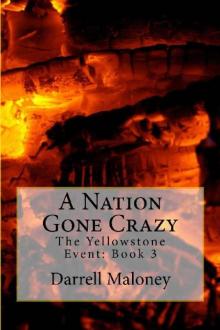 The Yellowstone Event (Book 3): A Nation Gone Crazy
The Yellowstone Event (Book 3): A Nation Gone Crazy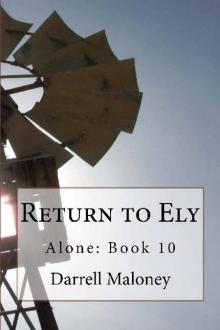 Alone (Book 10): Return To Ely
Alone (Book 10): Return To Ely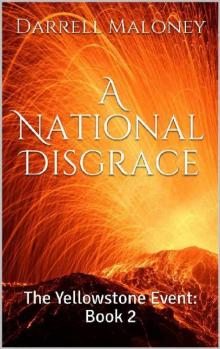 The Yellowstone Event (Book 2): A National Disgrace
The Yellowstone Event (Book 2): A National Disgrace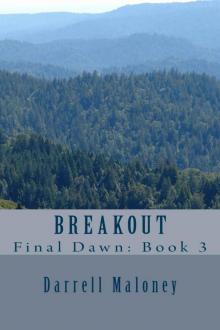 Breakout (Final Dawn)
Breakout (Final Dawn)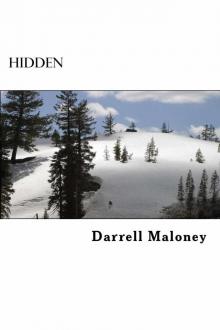 Hidden (Final Dawn)
Hidden (Final Dawn)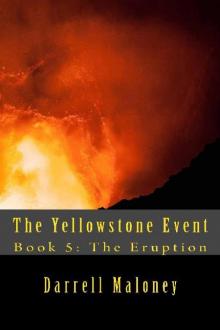 The Yellowstone Event (Book 5): The Eruption
The Yellowstone Event (Book 5): The Eruption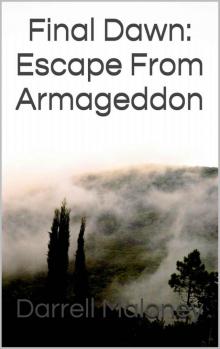 Final Dawn: Escape From Armageddon
Final Dawn: Escape From Armageddon